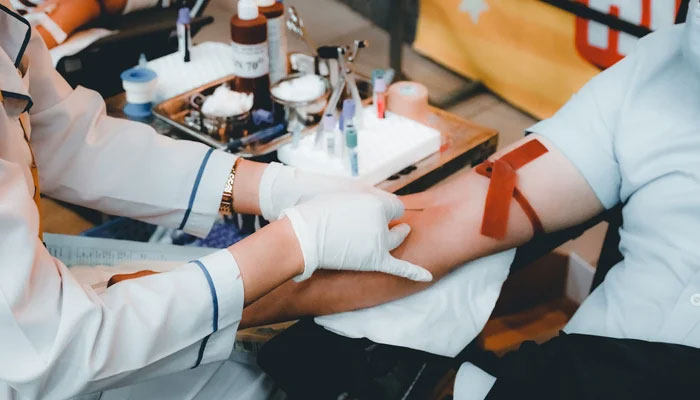Would-be couples urged to get screened for blood disorder
A blood bank and treatment facility in Karachi being run by the non-profit Saylani Welfare International Trust has been offering free-of-charge thalassaemia screening to let young would-be couples from underprivileged families determine before their marriage whether or not they carry the genes of the severe blood disorder so that they can protect the health of their coming generation.
This was informed to the audience who attended a seminar organised by the Saylani Blood Bank and Thalassaemia Centre on Wednesday to mark World Thalassaemia Day. The event was attended by children with thalassaemia and their parents.
The senior haematologists and health professionals who spoke on the occasion highlighted that the fatality rate among children with thalassaemia has been on the rise in Pakistan but young people from both genders motivated to get tested for this blood disorder before marriage would go a long way in reversing this trend.
They said that creating mass awareness about the severe blood disorder would be a step in the right direction to make Pakistan a thalassaemia-free country.
Saylani Trust CEO Madni Raza said that merely treatment and medication are not enough to combat genetic disorders like thalassaemia because people needed to have proper knowledge about such diseases as an effective means of prevention.
He lamented that several Nikah Khawan in the country do not have any knowledge about the law adopted for compulsory pre-marital thalassaemia screening in the country.
Sindh Blood Transfusion Authority (SBTA) Secretary Dr Durnaz Jamal stressed that the community fully support the government’s prevention and treatment efforts to overcome the thalassaemia disorder in Pakistan.
She urged the audience that pre-marital thalassaemia screening should be conducted on a compulsory basis. She said the community should fully back the government’s drive to implement the laws aimed at the prevention of genetic blood disorders.
She also said that a mass awareness campaign should be launched to persuade would-be couples to get tested for thalassaemia before their marriage on a compulsory basis. She added that the SBTA has been doing research on various aspects related to blood transfusion and related disorders.
Senior haematologist Dr Ghulam Sarwar informed the audience that the requirement of blood for transfusion services to treat the affected children has lately decreased at the Saylani Blood Bank and Thalassaemia Centre.
He said that at present 700 children are registered to get treatment services at the centre. In the past up to 1,600 pints of blood was required to treat them in a month, which has now decreased to 538 pints. This observation, he added, indicates that the best treatment and medication services have improved the health of the affected children. He also said research is being carried out to invent such medicines that would reduce the blood transfusion requirements for children with thalassaemia.
He urged would-be couples to undergo the pre-marital screening to ensure that their coming generation does not carry the thalassaemia major genes.
-
 'A Very Special Visitor' Meets Queen Camilla At Clarence House
'A Very Special Visitor' Meets Queen Camilla At Clarence House -
 Jodie Turner Smith Shares One Strict Rule She Follows As A Mom
Jodie Turner Smith Shares One Strict Rule She Follows As A Mom -
 Hailey Bieber Reveals KEY To Balancing Motherhood With Career
Hailey Bieber Reveals KEY To Balancing Motherhood With Career -
 Photo Of Jay-Z, Other Prominent Figures With Jeffrey Epstein Proven To Be Fake
Photo Of Jay-Z, Other Prominent Figures With Jeffrey Epstein Proven To Be Fake -
 Hillary Clinton's Munich Train Video Sparks Conspiracy Theories
Hillary Clinton's Munich Train Video Sparks Conspiracy Theories -
 Fans Slam Talk Show Host For 'cringe' Behavior In Chris Hemsworth Interview
Fans Slam Talk Show Host For 'cringe' Behavior In Chris Hemsworth Interview -
 Woman Jailed Over False 'crime In Space' Claim Against NASA Astronaut
Woman Jailed Over False 'crime In Space' Claim Against NASA Astronaut -
 James Van Der Beek’s Close Pal Reveals Family's Dire Need Of Donations
James Van Der Beek’s Close Pal Reveals Family's Dire Need Of Donations -
 Prince William And Harry's Cousins Attend 'Wuthering Heights' Event
Prince William And Harry's Cousins Attend 'Wuthering Heights' Event -
 Hailey Bieber Turns Heads Just Hours After Major Business Win
Hailey Bieber Turns Heads Just Hours After Major Business Win -
 King Charles' Andrew Decision Labelled 'long Overdue'
King Charles' Andrew Decision Labelled 'long Overdue' -
 Timothee Chalamet 'forever Indebted' To Fan Over Kind Gesture
Timothee Chalamet 'forever Indebted' To Fan Over Kind Gesture -
 Columbia University Sacks Staff Over Epstein Partner's ‘backdoor’ Admission
Columbia University Sacks Staff Over Epstein Partner's ‘backdoor’ Admission -
 Ozzy Osbourne's Family Struggles Behind Closed Doors
Ozzy Osbourne's Family Struggles Behind Closed Doors -
 Dua Lipa Claims Long-distance Relationship 'never Stops Being Hard'
Dua Lipa Claims Long-distance Relationship 'never Stops Being Hard' -
 BTS Moments Of Taylor Swift's 'Opalite' Music Video Unvieled: See Photos
BTS Moments Of Taylor Swift's 'Opalite' Music Video Unvieled: See Photos




